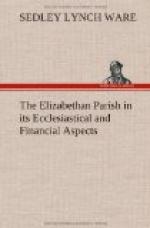[18] Toulmin Smith, The Parish (2d ed., 1857), 69 ff., strongly insists that churchwardens “never were ecclesiastical officers.” But the authorities he cites are post-Elizabethan. The courts in Elizabeth’s time held that the execution of the office “doth belong to the Spirituall jurisdiction” (See Brown v. Lother, 40 Eliz., in J. Gouldsborough’s Rep., ed. 1653, p. 113). Lambard (The Duties of Constables, etc., ed. 1619, p. 70) says that wardens are taken in favor of the church to be a corporation at common law for some purposes, viz., to be trustees for the church goods and chattels.
[19] See “The Othe which the Parsons ... shall minister to the Churche Wardens,” of which the text is given in Bishop Barnes’ Injunctions and other Ecclesiastical Proceedings, Surtees Soc., xxii (1850), 26 (Hereinafter cited as Barnes’ Eccles. Proc.). The wording of this oath is evidently very similar to, if not identical with, that of the oath administered to the wardens by the archdeacon.
[20] For a number of examples clearly illustrating this point see Visitations of the Dean of York’s Peculiar, Yorkshire Archaeological Journal. xviii (1905), 202, 221, 222, 224, et passim. Hereinafter cited as Dean of York’s Visit. We have a number of these articles of inquiry formulated by archbishops or bishops. E.g., see in T. Nash, Hist. and Antiq. of Worcestershire, i, 472 (Wardens of Grimley make answer to the 5th and 6th articles inquired of by the bishop in 1585). Cf. Cardwell, Doc. Ann., ii, 13-16 (Whitgift’s Articles of 1588).
[21] E.g., Canterbury Visit., xxv, 12 (Birchington wardens arraigned in court “for that they have not presented divers faults Committed within the parish.” 1591). Act-Books in Barnes’ Eccles. Proc., 118 (A warden of Long Newton detected to the official because “he refused to present faltes with his fellowe churchwardone, et fatebatur delationem, viz., that he wolde not present his owne wief.” 1579). Ibid., 129 (1580). See also Warrington Deanery Visit., 188 ("Departing and not exhibitinge there presentments"). W.H. Hale, Precedents in Causes of Office against Churchwardens and Others (1841), 81 (Wardens of Sarratt [Herts] excommunicated for not exhibiting their “billas detectionum.” 1577). The last named work hereinafter cited as Hale, Churchwardens’ Prec.
[22] For numerous examples of excommunication for non-appearance, see Barnes’ Eccles. Proc., 29 ff. Under the heading of each parish we see “aegrotat” or “excusatur,” or “nullo modo” (sc. comparuit) placed after the name of each person cited to attend from that parish. Incumbents, wardens and sidemen were almost always in attendance. Schoolmasters usually so when there were such. Delinquent parishioners were of course cited in person, or remanded to appear at the next court day holden elsewhere. Upon non-appearance the formula usually entered by the registrar or scribe in the act-book was “et omnes et singulos hujusmodi non comparentes [judex] pronuntiavit contumaces et eos excommunicavit in scriptis.” At Alnwick in 1578 fifteen persons were excommunicated for non-attendance. Barnes’ Eccles. Proc., 41. Cf. Hale, Crim. Prec., passim.




